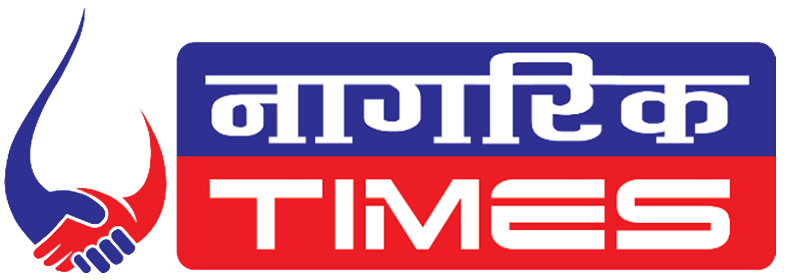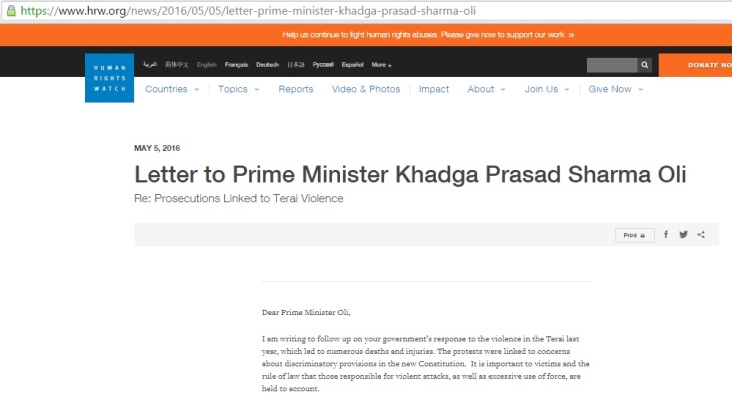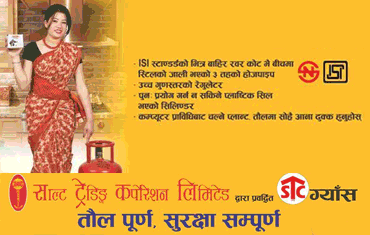ह्युमन राईट वाचको ओलीलाई पत्र : आन्दोलनमा मारिएकाहरुको निश्पक्ष छानविन गर
काठमाडौं । अन्तर्राष्ट्रिय मानव अधिकारबादी संस्था ह्युमन राईट वाचले नेपालका प्रधानमन्त्री केपी शर्मा ओलीलाई पत्र लेख्दै मधेश आन्दोलनमा मारिएकाहरुको निश्पक्ष छानविन हुनु पर्ने बताएको छ ।
वाचका एशिया डिभिजनका कार्यकारी निर्देशक ब्राड एड्म्सले प्रधामन्त्री ओलीलाई लेखेको पत्रमा मधेश आन्दोलनको क्रममा मारिएका सम्पूर्णको स्वतन्त्र तथा निश्पक्ष रुपले छानविन गर्न भनेको छ । उसले राष्ट्रिय मानव अधिकार आयोग अथवा स्वतन्त्र छानविन आयोग गठन गरेर अनुसन्धान गर्न सकिने भनेको छ ।
छानविन पछि आएको निष्कर्ष सार्वजनिक गरिनु पर्ने पनि वाचले जनाएको छ । विहीबार प्रधानमन्त्रीलाई पठाइएको पत्रमा प्रहरीद्वारा आन्दोलनको क्रममा मनोमानि ढंगले अनुसन्धान गरिएको र विना प्रमाण राजनीतिक कार्यकर्ताहरुलाई गिरफ्तार गरेको उल्लेख गरिएको छ ।
मानव अधिकार उल्लंघनका घटनामा संलग्न रहेका सुरक्षा अधिकारीहरुमाथि पनि कारवाही हुनु पर्ने वाचले जनाएको छ । वाचले मधेश आन्दोलनको क्रममा राज्य पक्षबाट अत्याधिक बल प्रयोग भएको पत्रमा लेख्दै ४५ जनाभन्दा बढी मारिएको जनाएको छ ।
यस्तो छ पत्र :
Letter to Prime Minister Khadga Prasad Sharma Oli
Dear Prime Minister Oli,
I am writing to follow up on your government’s response to the violence in the Terai last year, which led to numerous deaths and injuries. The protests were linked to concerns about discriminatory provisions in the new Constitution. It is important to victims and the rule of law that those responsible for violent attacks, as well as excessive use of force, are held to account.
Human Rights Watch is an independent, nongovernmental organization that investigates and reports on violations of international human rights law in more than 90 countries. Human Rights Watch has worked on human rights issues in Nepal for several decades.
In October last year Human Rights Watch reported on the protests and security force’s response in the Terai region which had, up to that time, cost the lives of approximately 45 people, including members of the police, protesters, and bystanders. Some protesters resorted to violence, and some members of the police and Armed Police Force used indiscriminate and excessive force against protesters. In each of the 25 protest-related deaths we investigated, including those of the police officers who were killed in Kailali and Mahottari districts, we found no evidence that any of the victims was posing a threat to another person at the time she or he was killed.
By the time the demonstrations ended in February 2016, around 55 people had been killed, including ten police officers.
Nepal’s National Human Rights Commission and other human rights organisations have also documented the unlawful manner in which Nepalis lost their lives during these protests.
Abuses by Protesters
Eight police officers were killed on August 25, 2015 in Tikapur when an angry mob of protesters encircled and viciously attacked a small group of police with handmade weapons. That same day an unknown assailant shot and killed the 18-month-old child of another officer. On September 11 in Mahottari another police officer was killed after being dragged from an ambulance while being taken to a hospital.
Excessive Use of Force by Security Forces
While the government had the responsibility to contain violent protests, security forces used excessive force and fired indiscriminately in several cases documented by Human Rights Watch. Among the cases we documented was that of Nitu Yadav, a child, whom numerous witnesses described being dragged from bushes where he was hiding and shot dead at point blank range by police officers in Janakpur on September 11. In another case, there is evidence that Hifajat Miya was shot dead by police as he lay wounded on the ground in Kalaiya.
According to the US State Department’s 2015 Human Rights Report, four people including a four-year-old child, were allegedly killed “when police fired shots from a bridge toward a market below, where the victims were carrying out everyday business.”
According to the investigation of Nepal’s National Human Rights Commission: “Security forces have been found to have used excessive force.”
Failure of Due Process and Accountability
The killings of eight police officers and an infant in Kailali, and of another police officer in Mahottari, are serious crimes. In these cases, the authorities conducted investigations and some suspects have been detained. Human Rights Watch understands that 23 people are in custody in Kailali and 3 in Mahottari and that the police are looking for other suspects who have evaded arrest. For justice to be done in these cases, it is crucial that due process is upheld and that each arrest is based on sufficient and credible evidence.
It is also imperative that detainees are treated properly. Human Rights Watch is deeply disturbed by the National Human Rights Commission’s findings that there have been incidents of “beating and abusing within the police stations against those arrested during the agitation.” Your government should issue immediate instructions to ensure that all detainees suspected of crimes during the protests are not tortured, that their rights are fully respected, and that they receive a fair trial. In light of the involvement of security forces in these events, we believe that a specially constituted independent investigation into these allegations should be undertaken forthwith and those responsible for mistreatment should be held accountable under the criminal law, as well as facing suspension or dismissal.
While arrests have been made for violence against the police, the government is yet to take steps to ensure that members of the security forces are held to account for human rights violations during the protests. The police are reportedly refusing to register First Information Reports (FIRs) filed on behalf of the victims. The Home Minister and other senior government figures have repeatedly defended the use of force against the protesters.
There are a number of cases currently before the courts in which victims or their families are seeking an order that the police accept FIRs in relation to alleged protest-related abuses. The Janakpur appellate court has given the police 15 days to respond. Activists are also preparing to file cases this week in Rautahat and Hetauda. It is extremely disturbing that victims or their families, and the lawyers representing them, have sometimes been subjected to threats and intimidation.
We urge you to issue instructions reminding the police of their duty to immediately accept such FIRs and to cooperate fully in investigations against themselves, including where the alleged perpetrator is a police officer or a member of the Armed Police Force.
Recommendations
Order a time-bound, independent investigation into all of the deaths which occurred in the context of the recent protests. To ensure the credibility of the investigation, the National Human Rights Commission or a separate independent body should be given a key role in the process, hearings should be held in public where possible, and the findings should be published in full.
Ensure that the police investigate all cases of human rights abuses during the protests, not just cases where the security forces were themselves victims. Instead of arbitrarily arresting protest leaders, prosecutions should be based on substantial and credible evidence.
Order police to register complaints of excessi
ve use of force and other abuses by security forces. Human Rights Watch understands that the Nepal police Human Rights Cell has already conducted an investigation into police action in three of the districts where violence occurred. Their findings should be published in full as soon as possible. Appropriate disciplinary and legal action should be taken.
Order an immediate investigation into allegations of torture and arbitrary arrests following the protests and hold the perpetrators to account.
Yours sincerely,
Brad Adams
Executive Director
Asia Division










